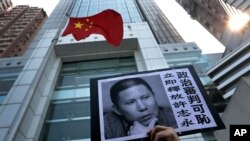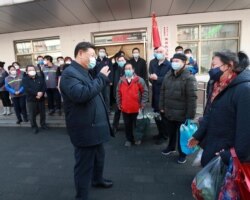Prominent Chinese legal academic and activist Xu Zhiyong, who has urged President Xi Jinping to step down over China’s major crises including the coronavirus epidemic, has been detained by authorities in South China, activists said Monday.
His detention is the latest in a crackdown on free speech as China maneuvers to control the narrative on the growing coronavirus epidemic.
Activists said police on Saturday arrested Xu Zhiyong, a former law professor known for founding the New Citizens Movement social campaign, while he was staying at the home of a lawyer in the southern Chinese city of Guangzhou.
The lawyer, Yang Bin, her husband and son were also detained by police for hiding Xu but were released Sunday evening, the activists said.
Police declined to comment by phone on Monday.
Xu has been on the run from state security police since December, after the police started rounding up participants of a secret gathering in the southeastern city of Xiamen in Fujian province. Xu was among some 20 activists and human rights lawyers attending.
He delivered harsh criticisms of Xi in an impassioned online essay that was posted in early February, blasting the leader for what Xu said was Xi's inability to cope with crises that included the coronavirus epidemic and the Hong Kong pro-democracy protests. Xu predictied in his essay that his bold words would likely result in his jailing yet again.
Xu has already served a four-year prison sentence for his efforts to promote the rights of China's internal migrants rights and his campaign to get officials to be transparent about their personal assets through his New Citizens Movement. Xu has been critical of what activists say is Xi's policy of maintaining stability the cost of civil freedoms and human rights.
"Where are you taking China? Do you know? Towards democracy or dictatorship? Modernization or the Cultural Revolution?" Xu wrote.
He called on Xi Jinping to resign.“
I don’t think you’re an evil man, you’re just not wise… Mr. Xi Jinping, please step down,” he wrote.
Meanwhile, reports in the last few days said authorities placed a prominent legal scholar, Xu Zhangrun, under virtual house arrest this month and cut off his access to the Internet after he published an online essay in which he blamed President Xi for the spread of the coronavirus, saying the epidemic has “revealed the rotten core of Chinese governance.”
A friend of the scholar, who requested anonymity to out of fear of reprisals, said police restricted Xu's movements after he returned to Beijing from his lunar new year break, saying he had been placed under quarantine.
Teng Biao, a U.S.-based human rights advocate and longtime friend of Xu Zhiyong, said room for freedoms has already become “extremely limited” under Xi’s rule and the epidemic has given the government another excuse to tighten controls.“
Fewer people are now willing to speak up because the risk is extremely big. The Communist Party cannot tolerate any civil resistance even if it’s just a bunch of people talking over dinner,” said Teng, who was frequently harassed and detained by the authorities before he moved to the United States in 2014.











